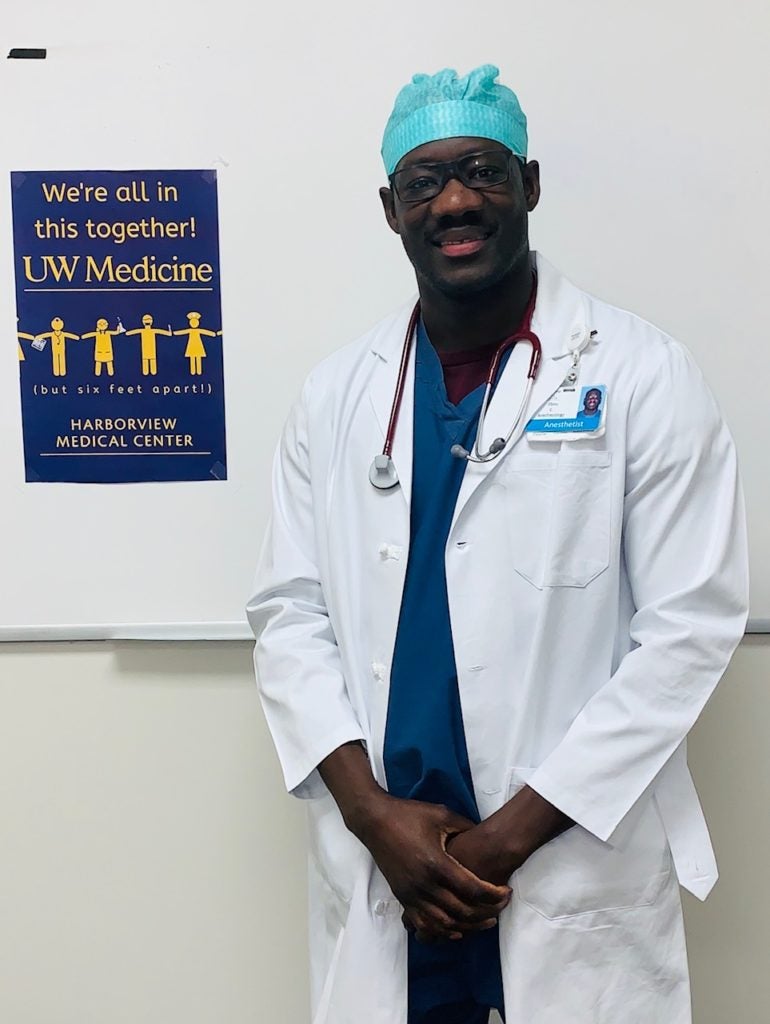Nurse Anesthesia Alumnus Contributes to COVID-19 Response at Harborview Medical Center
April 16, 2020 – Georgetown alumnus Ebou M A Cham (G’14) is a certified registered nurse anesthetist who has been working for several years at Harborview Medical Center in Seattle, Washington. During the COVID-19 pandemic, he has been participating in Harborview’s response efforts. Cham was recently featured, among others, in the Reuters’ photo story, “Faces of Seattle’s Coronavirus Frontline.”

Ebou M A Cham (G’14)
Question: Tell us about what you have been doing since your Georgetown graduation.
Cham: Since graduating from Georgetown University’s Nurse Anesthesia Program in December 2014, I have been working as a certified registered nurse anesthetist (CRNA) and bringing the cura personalis spirit to Harborview Medical Center in Seattle, Washington. I also work part time as an independent anesthesia contractor in several clinics and surgery centers around the Seattle area.
Thanks to Georgetown’s emphasis on fostering both local and global health justice, I have come to develop a keen interest in global health work, which is where I now find the most joy. In June of 2019, I had the privilege of going to Liberia, West Africa, for a medical mission where our team conducted 102 free major and minor surgeries. I was particularly honored to have been in the company of two former Georgetown Nurse Anesthesia Program classmates of mine: Sigrid Marfo (G’14), CRNA, and Kaia Finney (G’14), a chief CRNA.
Presently, I am partnering with other CRNAs to create an anesthesia library for student anesthetists and practicing nurse anesthetists at a resource-scarce hospital in The Gambia, West Africa. Related to this work, I was delighted to be invited to co-present about anesthesia in the country at the fall 2019 Washington State Nurse Anesthesia Conference.
Question: How has COVID-19 affected Harborview?
Cham: Harborview is a unique hospital setting in that it is a public hospital and the only level 1 trauma and regional burn center serving Washington, Alaska, Montana, and parts of Idaho and Wyoming, essentially covering 25 percent of the United States landmass. Amid the coronavirus pandemic, the hospital now also serves as a COVID-19 Command Center for all hospitals in western Washington. As a result, proactive plans and guidelines on how to handle and care for COVID-19 patients have been set into place and are reviewed daily to accommodate for any unpredictable surge of COVID-19 patients needing urgent acute and or intensive care.
CRNAs have always played a vital frontline role in the delivery of safe and effective health care. This role becomes even more critical during global crises such as the insidious and deadly COVID-19 pandemic that we now face. As a CRNA, I primarily practice in the perioperative setting managing anesthesia needs of both trauma victims and elective surgery patients. I also, on rotation, carry the hospital-wide airway pager and, in collaboration with our anesthesiologist colleagues, respond to and manage emergent airway needs of patients in the emergency department, ICUs, and other acute care units, including designated hospital wards holding COVID-19 patients.
Question: Tell us about changes to your anesthesia practice given COVID-19.
Cham: The pandemic has impacted my practice on several fronts. The drastic drop in elective surgery cases, in adherence to national guidelines, has significantly impacted our daily perioperative workflow at Harborview. Surgical workload has decreased, but background stress level has increased due to fear of the unknown. We now attempt to test every surgical patient for COVID-19 prior to surgery which has occasionally been challenging in the setting of trauma patients arriving for emergent surgical interventions with unknown COVID-19 status.
We balance the rationing of personal protective equipment with the need for required droplet and airborne precautions on confirmed or unknown COVID-19 patients. We attempt to limit the duration of aerosol-generating anesthesia procedures such as intubations and extubations to bare necessity in order to reduce potential viral spread.
As CRNAs we possess a unique and wide-ranging skill set that has been recognized as a very valuable resource during this time of crisis. As such, we are being asked to orient to other areas of the hospital such as ICUs in the event that we are deployed to areas of need within the system.
Question: What are some of your reflections about the current situation?
Cham: The coronavirus pandemic is indeed a global health concern that has also ruthlessly excavated the longstanding disparities in the U.S. health care system and beyond. More health care personnel are working without proper protective gear. And more people of color and the socio-economically marginalized continue to bear the morbidity and mortality brunt of yet another public health disaster.
Unfortunately, hoping that we never experience another pandemic ever again will be all but blind optimism, as history will inevitably prove otherwise. In its wake, therefore, I hope lessons learned from this pandemic will leave us better prepared in detecting and managing future national and global public health crises. And if there is any sliver of a silver lining, it is that the indiscriminate voracity of the coronavirus at least brought humility back into our collective human existence, a tool critical in building on the strength of our differences.
